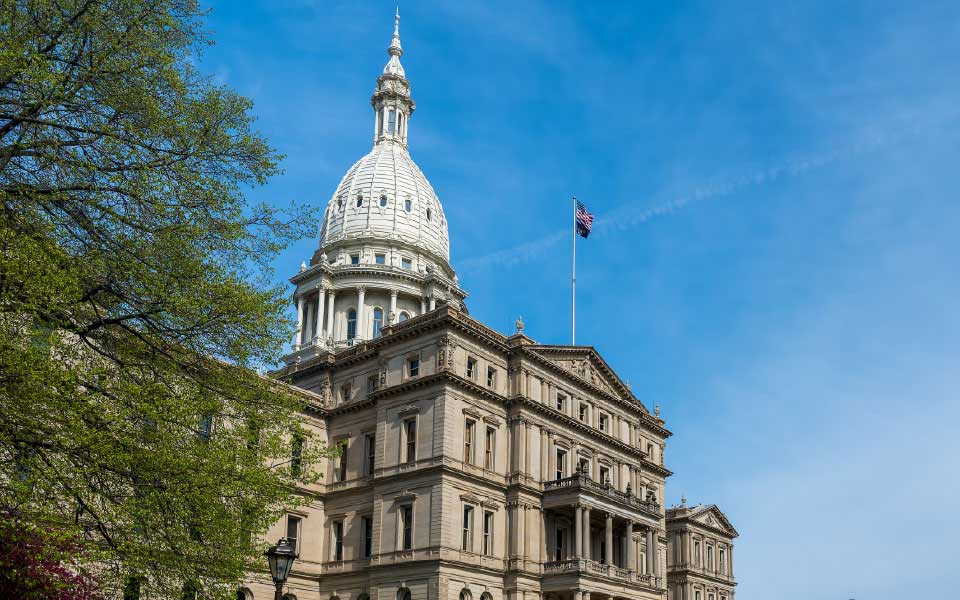On Oct. 7, 2025, Michigan Gov. Gretchen Whitmer signed House Bill 4961 into law which “decouples” Michigan’s tax laws from certain targeted provisions of the One Big Beautiful Bill Act (OBBBA) enacted earlier this year. The new Michigan legislation also adopts some individual taxpayer-favorable provisions of the OBBBA, but not all of them.
Like many states with an income tax, Michigan is a “rolling conformity” state, so it automatically conforms to changes made to federal tax laws unless the state legislature formally chooses to “decouple” from them through specific legislation. This summer, the OBBBA made several taxpayer-favorable changes to federal income tax laws, and the Michigan legislature has decided that it cannot follow all of them due to their potential negative impact on the state’s finances, so several “decoupling” measures have been enacted for business taxpayers:
Research & Experimental (R&E) Costs
The OBBBA allows businesses to go back to currently deducting their costs for domestic R&E activities instead of having to capitalize and amortize them over a five-year period. Michigan will not follow this federal law change, meaning Michigan businesses must continue to capitalize and amortize their domestic R&E costs for state income tax purposes.
100% Depreciation Allowance for Qualified Production Property
The OBBBA introduced a new federal tax deduction allowing businesses that construct or purchase certain “qualified production property” (typically factory buildings and similar facilities used to manufacture or process products in the United States) to elect to immediately write-off 100% of their costs instead of depreciating them over 39 years. Michigan taxpayers who take advantage of the new federal deduction will need to add it back to their state tax base and depreciate the property over several decades.
Increased Deduction for Interest Expense
The OBBBA amended section 163(j) of the federal tax code, which had previously limited a company’s deduction for interest expense to 30% of its “adjusted taxable income (ATI),” which is effectively taxable income before interest expense. Under the OBBBA, in addition to the add-back for interest expense, businesses must add back to their ATI deductions taken for depreciation and amortization, thus potentially providing a larger interest deduction for them. Under Michigan law, businesses will not be able to add depreciation and amortization back to ATI, which may result in them having a smaller interest deduction and, in turn, higher taxable income for state tax purposes.
Increased Section 179 Expensing
Internal Revenue Code Section 179 allows businesses to immediately deduct the cost of most assets used in a trade or business other than real estate. In 2024, the deduction was capped at $1,220,000, but the OBBBA has increased the cap to $2.5 million retroactive to January 2025. Michigan will not be following the increased deduction cap.
100% Bonus Depreciation
Retroactive to assets placed in service after Jan. 19, 2025, the OBBBA brings back 100% bonus depreciation on purchases of tangible personal property used in a trade or business. Michigan has not followed previous iterations of federal bonus depreciation acts and has chosen not to follow the new 100% bonus depreciation provisions either.
It is not all bad news for Michigan taxpayers, though. The legislature did adopt two favorable provisions of the OBBBA affecting individuals:
Deduction for Qualified Tip Income
Individual taxpayers who are eligible to claim the new deduction for qualified tip income on their federal tax return may also claim that deduction on their Michigan individual tax return.
Deduction for Overtime Income
Individuals earning qualified overtime income and who are eligible to deduct it on their federal income tax return may take the same deduction on their Michigan tax return.
Michigan did not adopt the new federal individual deductions for Seniors or for interest on loans used to purchase U.S.-assembled vehicles.
Michigan is just the latest state to formally decouple from certain provisions of the OBBBA. Previously, Rhode Island’s legislature voted to decouple that state from all of the OBBBA’s tax provisions, and Maryland has announced that it will not be following the new deductions for R&E costs, the expanded section 163(j) interest limitation base and 100% depreciation on Qualified Production Property for a one-year period. In the next several months we may see other “rolling conformity” states enact decoupling legislation for certain OBBBA provisions.
Should you have any questions about Michigan’s tax law changes or the OBBBA’s effect on other state taxes, please contact your CBIZ SALT team representative.
© Copyright CBIZ, Inc. All rights reserved. Use of the material contained herein without the express written consent of the firms is prohibited by law. This publication is distributed with the understanding that CBIZ is not rendering legal, accounting or other professional advice. The reader is advised to contact a tax professional prior to taking any action based upon this information. CBIZ assumes no liability whatsoever in connection with the use of this information and assumes no obligation to inform the reader of any changes in tax laws or other factors that could affect the information contained herein. Material contained in this publication is informational and promotional in nature and not intended to be specific financial, tax or consulting advice. Readers are advised to seek professional consultation regarding circumstances affecting their organization.
“CBIZ” is the brand name under which CBIZ CPAs P.C. and CBIZ, Inc. and its subsidiaries, including CBIZ Advisors, LLC, provide professional services. CBIZ CPAs P.C. and CBIZ, Inc. (and its subsidiaries) practice as an alternative practice structure in accordance with the AICPA Code of Professional Conduct and applicable law, regulations, and professional standards. CBIZ CPAs P.C. is a licensed independent CPA firm that provides attest services to its clients. CBIZ, Inc. and its subsidiary entities provide tax, advisory, and consulting services to their clients. CBIZ, Inc. and its subsidiary entities are not licensed CPA firms and, therefore, cannot provide attest services.















